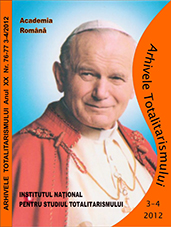Provocări epistemologice ale teoriei totalitarismului, II
Epistemological Challenges of the Totalitarian Theory, II
Author(s): Florin AbrahamSubject(s): History
Published by: Institutul National pentru Studiul Totalitarismului
Keywords: Totalitarianism; communism; methodology; Soviet Union; Eastern Europe
Summary/Abstract: The study analyzes the epistemological implications of the classic theory concerning totalitarianism. Two books represent the latter: Hannah Arendt, The Origins of Totalitarianism and Carl J. Friedrich, Zbigniew K. Brzezinski, Totalitarian Dictatorship and Autocracy. The research is trying to give an answer to the issue of totalitarian theory validity for analysis of communism. The main controversy points generated by totalitarian theory are evaluated, as follows: the relation between the state-party and society; the role of terror and propaganda; their static and closed character; the role of leaders during systemic changes; implications of the fascism-communism comparisons etc. The main conclusion of the study is that totalitarian theory has, at present, a marginal utility for the study of communist regimes.
Journal: Arhivele Totalitarismului
- Issue Year: XX/2012
- Issue No: 3-4
- Page Range: 173-187
- Page Count: 15
- Language: Romanian
- Content File-PDF

